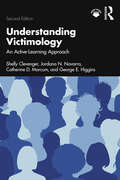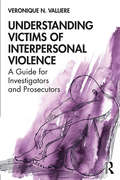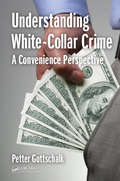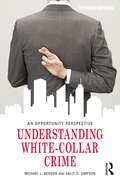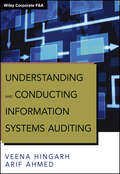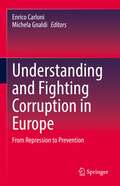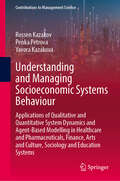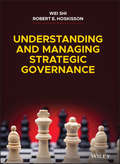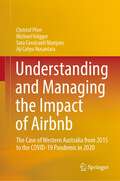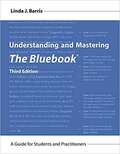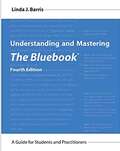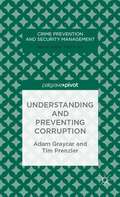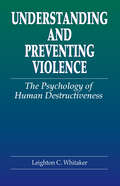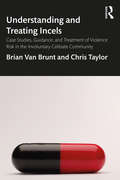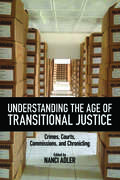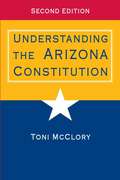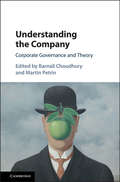- Table View
- List View
Understanding Victimology: An Active-Learning Approach
by George E. Higgins Catherine D. Marcum Shelly Clevenger Jordana N. NavarroUnderstanding Victimology: An Active Learning Approach is the only textbook with extensive discussion of both online and offline victimization reinforced by group and individual learning activities. Our textbook offers instructors a variety of active learning exercises – in the book itself and in the authors’ ancillaries – that engage students in the material and shed light on the experiences of marginalized social groups. Through these activities, students become engaged with the material at a higher level of learning. They learn how victimization happens and the challenges people who experience crime face in acquiring assistance from the criminal-legal system at a more intimate level instead of simply reading about it. Students also build their abilities to work with others in a collaborative learning environment, encouraging professional socialization for the future. The chapters in this second edition address gaps in information typically presented in victimology that ignore prevention or intervention, even though these topics are currently at the forefront of the national conversation going on about sexual violence in higher education. New to this edition are added coverage of immigrants and minorities and new chapters on the media and victimization and on victimization across the gender spectrum, as well as an online instructor resource covering UK case studies, legal framework, and social context that broadens the book’s global appeal. Suitable for undergraduate courses in victimology, this book also serves the needs of sociology and women’s studies courses and can be taught university-wide as part of diversity and inclusion initiatives.
Understanding Victims of Interpersonal Violence: A Guide for Investigators and Prosecutors
by Veronique N. ValliereUnderstanding Victims of Interpersonal Violence: A Guide for Investigators and Prosecutors provides accessible information for criminal justice personnel "in the trenches" with victims of violence to aid in understanding and explaining their behavior. This guide sheds light on interpersonal violence victims’ decisions and actions by providing context and naming factors that commonly impact victim responses. These include internal factors such as culture, religion, shame, and personality, as well as external factors like access to services, support systems, and resources. These factors inhibit or facilitate responses like disclosure, resistance, and participation (or lack thereof) in the prosecution of the offenders. This book also explores the influence of the perpetrator, as well as more deeply examining victim responses that typically offer challenges to investigators and prosecutors; for example, continued contact with the offender, lack of resistance, and issues in disclosure. Finally, the guide provides concrete tools to assist investigators in interviewing and for prosecutors to use during the prosecutorial process. This book is designed for investigators, prosecutors, advocates, criminal justice practitioners, and students of these subjects.
Understanding White-Collar Crime: A Convenience Perspective
by Petter GottschalkUnderstanding White-Collar Crime develops the concept of convenience as the main explanation for crime occurrence. Examining all three dimensions of crime—economic, organizational, and behavioral—the book argues that when white-collar crime becomes less convenient, crime rates will go down. By applying convenience theory to an empirical sample of convicted white-collar criminals, the text teaches criminal justice students and ethics and compliance practitioners to identify and understand how opportunity affects real-world criminal situations. Internal investigations of white-collar crime are discussed, and corporate social responsibility against white-collar crime is emphasized. Understanding White-Collar Crime: A Convenience Perspective examines not only the theories behind white-collar crime, but also explores methods used in criminal justice investigations into corporate fraud, and emphasizes the importance of corporate social responsibility in reducing crimes of this nature. Criminal justice students and practitioners should not miss this close look into the world of white-collar crime.
Understanding White-Collar Crime: An Opportunity Perspective
by Michael L. Benson Sally S. SimpsonUnlike other books of its kind, Understanding White-Collar Crime: An Opportunity Perspective uses a coherent theoretical perspective in its coverage of white-collar crime. Using opportunity perspective, or the assumption that all crimes depend on offenders having some sort of opportunity to commit an offense, allows the authors to uncover the processes leading up to white-collar crimes and offer potential solutions to this rampant issue, without being reductive in their treatment of the topic. With this second edition, Benson and Simpson have greatly expanded their coverage to include new case studies, substantive materials, and an annotated appendix of online resources to make this a core book for courses on white-collar crime.
Understanding Your Living Will: What You Need to Know Before a Medical Emergency
by Fred MirarchiIs Your Living Will Compromising Your Safety? If you have a living will, you probably had it prepared so your wishes could be carried out if you became incapable of making your own medical decisions. But, did you realize there is a risk of your living will being misinterpreted? Patients who are not terminally ill die in hospitals every year because of medical staff misinterpretations of living wills. These are patients who would have otherwise lived if treated. But, too often, patients with living wills are treated as DNR—a code status understood by physicians and staff to mean "do not resuscitate." However, in many cases their status should have been "Full Code," which tells those in authority to use aggressive efforts to save patients' lives. Unfortunately, living wills do not contain patient code status designations and therein lies the problem. As an emergency room physician, Ferdinando L. Mirarchi, D.O. understands how these misinterpretations happen. In Understanding Your Living Will, Dr. Mirarchi explains how to include lifesaving patient code status information in your living will and in the living wills of your loved ones. Among the questions he answers: · How can you be sure your living will makes your wishes clear?· What are the hidden dangers in living wills?· How can you avoid the misinterpretation of a DNR code status?· When does a living will become active?· Why is it important to have a health care power of attorney?· What is a health care proxy? A Book to Help You Ensure Your Living Will Follows Your Wishes
Understanding and Conducting Information Systems Auditing + Website
by Arif Ahmed Veena HingarhA comprehensive guide to understanding and auditing modern information systemsThe increased dependence on information system resources for performing key activities within organizations has made system audits essential for ensuring the confidentiality, integrity, and availability of information system resources. One of the biggest challenges faced by auditors is the lack of a standardized approach and relevant checklist. Understanding and Conducting Information Systems Auditing brings together resources with audit tools and techniques to solve this problem.Featuring examples that are globally applicable and covering all major standards, the book takes a non-technical approach to the subject and presents information systems as a management tool with practical applications. It explains in detail how to conduct information systems audits and provides all the tools and checklists needed to do so. In addition, it also introduces the concept of information security grading, to help readers to implement practical changes and solutions in their organizations.Includes everything needed to perform information systems auditsOrganized into two sections--the first designed to help readers develop the understanding necessary for conducting information systems audits and the second providing checklists for auditsFeatures examples designed to appeal to a global audienceTaking a non-technical approach that makes it accessible to readers of all backgrounds, Understanding and Conducting Information Systems Auditing is an essential resource for anyone auditing information systems.
Understanding and Conducting Information Systems Auditing + Website (Wiley Corporate F&A)
by Arif Ahmed Veena HingarhA comprehensive guide to understanding and auditing modern information systemsThe increased dependence on information system resources for performing key activities within organizations has made system audits essential for ensuring the confidentiality, integrity, and availability of information system resources. One of the biggest challenges faced by auditors is the lack of a standardized approach and relevant checklist. Understanding and Conducting Information Systems Auditing brings together resources with audit tools and techniques to solve this problem.Featuring examples that are globally applicable and covering all major standards, the book takes a non-technical approach to the subject and presents information systems as a management tool with practical applications. It explains in detail how to conduct information systems audits and provides all the tools and checklists needed to do so. In addition, it also introduces the concept of information security grading, to help readers to implement practical changes and solutions in their organizations.Includes everything needed to perform information systems auditsOrganized into two sections--the first designed to help readers develop the understanding necessary for conducting information systems audits and the second providing checklists for auditsFeatures examples designed to appeal to a global audienceTaking a non-technical approach that makes it accessible to readers of all backgrounds, Understanding and Conducting Information Systems Auditing is an essential resource for anyone auditing information systems.
Understanding and Fighting Corruption in Europe: From Repression to Prevention
by Michela Gnaldi Enrico CarloniThe volume includes comparative and comprehensive discussions on anti-corruption policies of governments and anti-corruption agencies across Europe. Compared to existing literature that focuses either on general and theoretical aspects related to corruption or on country-specific experiences, this volume provides an interdisciplinary and broad overview of corruption prevention policies and measures undertaken by major European member states, relying both on literature and on institutional documentation of national anti-corruption agencies, which greatly contribute to shaping anti-corruption policy directions. In so doing, it advances the existing theoretical agenda of corruption studies and policies, situating it within wider disciplinary fields. This volume is especially concerned with the interrelationship between good administration, integrity, ethical behaviour and corruption; the role of transparency and digitalisation in preventing corruption and ensuring rights, efficiency and impartiality in the public administration; the measurement of corruption, with specific reference to preventative measures and indicators of administrative anti-corruption efforts; big data, block chains, and artificial intelligence; public management codes of ethics, performance targets and skills, and their role in tackling and preventing corruption; and public procurement, transparency and anti-bribery measures in the European public procurement system. This volume is of interest to graduate students and researchers in political sociology, political science, European corruption law, international relations, public policy, and social statistics.
Understanding and Managing Socioeconomic Systems Behaviour: Applications of Qualitative and Quantitative System Dynamics and Agent-Based Modelling in Healthcare and Pharmaceuticals, Finance, Arts and Culture, Sociology and Education Systems (Contributions to Management Science)
by Rossen Kazakov Penka Petrova Yavora KazakovaThis book illustrates effective decision-making in complex socio-economic systems utilising system dynamics and agent-based simulation modelling approaches. It provides practical guidance on the application of conceptual and numerical modelling and simulation for analysing economic, strategic, regulatory, sociological and ethical questions from a complex systems perspective. Its theoretical, methodological and practical illustrations will enhance readers’ understanding of the application of simulation modelling for effective systems management. By virtually experimenting with alternative management scenarios, it will help them improve decision-making and control mechanisms. The book explores practical examples from the fields of pharmaceuticals, healthcare, finance, sociology, education and culture from a strategic, regulatory and ethics perspective. As such, it offers a valuable resource for managers, both at for-profit corporations and non-profit organisations, public policymakers and regulators alike.
Understanding and Managing Strategic Governance
by Robert E. Hoskisson Wei ShiExplore the interplay between corporate governance and strategic decision-making in this startling new resource In Understanding and Managing Strategic Governance, strategy and management experts Dr. Wei Shi and Robert E. Hoskisson deliver an insightful exploration of the influence that governance actors, like the board of directors, activist investors, institutional investors, and securities analysts, have on important strategic decisions. Based on surveying the latest research and analyzing unique datasets compiled by the authors, the book explains the impact that governance actors have on a firm’s strategic choices and the quality of such choices as well as the unintended consequences of that impact. The authors also describe how executives can manage the conflicting interests of multiple governance actors and leverage the influence of these actors to make effective strategic decisions. In this book, you’ll discover: How to avoid the strategic pitfalls that arise from governance actor influence and harm firms’ long-term competitiveness The effect that governance actors can have on corporate strategy, competitive strategy, corporate innovation strategy, global strategy, stakeholder strategy, and more The latest trends in corporate governance and their implications for managers, regulators, and policy makers in this area Perfect for C-level executives, board of directors, and institutional investors as well as students of corporate governance and strategy, Understanding and Managing Strategic Governance is a revealing and original examination of the interplay between corporate governance and firm strategy and how to manage that interplay to create sustainable competitive advantages.
Understanding and Managing the Impact of Airbnb: The Case of Western Australia from 2015 to the COVID-19 Pandemic in 2020
by Michael Volgger Christof Pforr Sara Cavalcanti Marques Aji Cahya NusantaraThis book explores the rapid growth of the sharing economy, specifically of Airbnb, in recent years and how it has challenged traditional economies in many countries around the globe. With almost 5 million listings in more than 190 countries, many consider Airbnb as one of the most disruptive developments in tourism over the past decade. While this is a book about Western Australia as a case in point, the issues addressed in this book speak to the broader development of the sharing economy and its effects experienced nationally and indeed internationally. Thus, through the adoption of a case-specific analysis of the growth and impact of Airbnb, the book significantly contributes to closing existing knowledge gaps on the Airbnb phenomenon by exploring not only stakeholder perceptions of the sharing economy and Airbnb, the extent of Airbnb supply and demand, and how this differs from conventional accommodation demand, but also what policy responses have been employed in other tourism destinations worldwide. Western Australia in this regard serves as an exemplar case to shed light on the Airbnb phenomenon. This book presents a comprehensive global study that has investigated the Airbnb phenomenon from a supply, demand, stakeholder, and government response perspective and thus offers new empirical insights, which are of interest to government agencies and the tourism sector and are a valuable source of data to inform current policy debate.
Understanding and Mastering The Bluebook: A Guide for Students and Practitioners
by Linda J. BarrisThe Bluebook provides the rules for legal citation, but can be intimidating and frustrating to use. With its simple building-block approach, this popular survival manual teaches how to understand and master the essential rules for legal practitioners. Rules are fully described and illustrated using: <p><p> Clear explanations and illustrations of the basic components of legal citations; <p><p> Step-by-step instructions for building citations to the most common authorities cited by legal practitioners; <p><p> Detailed guidance for citing legal materials to both print and electronic sources; <p><p> Examples, comparison charts, illustrations, and bullet-point explanations designed for quick mastery of basic Bluebook citation rules; <p><p> Tips, hints, and cautions to help users avoid common citation errors; <p><p> Cross references to the controlling Bluebook rules; and a user-friendly format gathering The Bluebook's scattered rules for each authority into one place. <p><p> The third edition of Understanding and Mastering The Bluebook is thoroughly revised and updated to the 20th edition of The Bluebook, and is an indispensable tool for anyone who is new to legal citation or whose skills need refreshing.
Understanding and Mastering The Bluebook: A Guide for Students and Practitioners
by Linda J. BarrisThe Bluebook® provides the rules for legal citation, but can be intimidating and frustrating to use. With its simple building-block approach, this survival manual teaches how to understand and master the essential rules for legal practitioners. Rules are fully described and illustrated using: Clear explanations and illustrations of the basic components of legal citations; Step-by-step instructions for building citations to the most common authorities cited by legal practitioners; Detailed guidance for citing legal materials to both print and electronic sources; Examples, comparison charts, illustrations, and bullet-point explanations designed for quick mastery of basic Bluebook citation rules; Tips, hints, and cautions to help users avoid common citation errors; Cross references to the controlling Bluebook rules; and A user-friendly format gathering The Bluebook's scattered rules for each authority into one place. For readers interested in further practicing their citation skills, Linda Barris created Mastering The Bluebook Interactive Exercises, an online learning tool. The new edition will coordinate with both Understanding and Mastering The Bluebook, Fourth Edition and The Bluebook, 21st Edition (both out summer 2020). Each copy of Understanding and Mastering The Bluebook, Fourth Edition includes a discount code for 20% off the purchase of Mastering The Bluebook Interactive Exercises.
Understanding and Negotiating Construction Contracts: A Contractor's and Subcontractor's Guide to Protecting Company Assets
by Kit WerremeyerConstruction is a complex business. Each project has its own unique physical and commercial considerations. Since there's no such thing as a "standard" or "typical" construction project, construction contracts should also not be considered standard. The contractor must carefully manage both in order to have a successful outcome and protect the company's interests and assets. This book will help you manage all these elements of the contract:- Scope of work and schedule - Terms of payment and cash flow - Assurances of performance - Insurance, bonding, indemnity, and warranties - Changes to the contract - Disputes and their resolution - Damages - Termination and suspension - Force majeure - International contracting
Understanding and Negotiating Construction Contracts: A Contractor's and Subcontractor's Guide to Protecting Company Assets
by Kit WerremeyerUnderstanding and Negotiating Construction Contracts The complexities of construction contracts are made easy with this thorough and readable guide Construction contracts can be complex for both owners and contractors. For contractors, negotiating fair and balanced commercial terms in contracts is just as important as properly managing projects; a properly negotiated contract can mitigate unnecessary risk and unnecessary risk transfer. This, in turn, reduces exposure to financial liability for the contractor and for avoidance of contract claims and disputes. Understanding and Negotiating Construction Contracts provides a comprehensive and readable introduction to the world of construction contracts. Providing, for example, coverage of the four most common types of contracts—lump sum/fixed-price, cost-plus, time-and-materials, and unit-pricing—it promises to reduce uncertainty and allow contractors to enter contractual negotiations with greater confidence to be able to achieve a fair and balanced contract. This updated new edition reflects the up-to-date best practices to understand how to better negotiate the commercial terms and conditions in construction contracts. Readers of the second edition of Understanding and Negotiating Construction Contracts will also find: Updated information on indemnity, insurance, and negotiation An all-new chapter with a contract analysis checklist Real-world examples drawn from small residential, retail, large commercial, and international projects Understanding and Negotiating Construction Contracts is essential for construction professionals and college students studying construction contracts and the liabilities arising out of them.
Understanding and Negotiating EPC Contracts, Volume 1: The Project Sponsor's Perspective
by Howard M. SteinbergIn Understanding and Negotiating EPC Contracts, Volume 1, Howard M. Steinberg presents a practical and comprehensive guide to understanding virtually every aspect of engineering, procurement and construction (EPC) contracts for infrastructure projects. The 25 chapters in Volume 1 are supplemented with real-life examples and court decisions, and offer tactical advice for anyone who must negotiate or understand EPC contracts in connection with the implementation, financing or operation of infrastructure projects. Emphasizing current market practices and strategic options for risk sharing, the book contains a narrative explanation of the underpinning of all of the issues involved in EPC contracting. Exhaustive in scope, it clarifies the fundamental commercial principles and pitfalls of "turnkey" contracting for all types of capital investments ranging from electrical and thermal power generation (including combined heat and power, nuclear, wind, solar, natural gas and coal) to refining, to chemical processing to LNG liquefaction and re-gasification to high speed rail, bridging, tunneling and road building. Providing clear and thorough analyses of the issues and challenges, this volume will be of great value to all those involved in complex construction projects.
Understanding and Negotiating EPC Contracts, Volume 2: Annotated Sample Contract Forms
by Howard M. SteinbergAny project which involves an EPC contract is also likely to involve a number of other complicated contracts. The challenge of the parties to an EPC contract is not to try to eliminate risk but rather put into place a narrative structure that enables the parties to predict the contractual result that would obtain if a risk materializes. If the EPC contract does not allow the parties to determine the consequences of an unanticipated situation, they will have to look to an expert, mediator, tribunal, or court to impart guidance or pass judgment. The sample forms of contract contained in Volume 2 of Understanding and Negotiating EPC Contracts are intended to serve as a guide to demonstrate how risks and responsibilities can be allocated among project sponsors, EPC contractors and the various other parties that may be involved in a project. Collectively the sample forms in this volume offer an extraordinary resource that provides the benefit of lessons learned and priceless insight into any project being undertaken which can help assure the resilience of any EPC project.
Understanding and Preventing Corruption
by Tim Prenzler Adam GraycarGraycar and Prenzler present a readily accessible guide to the issues of public and private sector corruption, outlining the nature and dimensions of corruption problems in a variety of settings across the world, and providing a set of practical strategies to prevent corruption that also facilitate economic growth and development.
Understanding and Preventing Violence: The Psychology of Human Destructiveness (Pacific Institute Series on Forensic Psychology)
by Leighton C. WhitakerMore violence has been perpetrated in the 20th century than in the two previous centuries combined. Understanding and Preventing Violence: Unmasking the Mentality of Human Destructiveness elucidates the mentality of destructive behavior with the hopes that in the future, the trend may be reversed through enlightenment. But in order to choose to be
Understanding and Profiting from Intellectual Property
by Deli YangA new look at the strategic and managerial issues surrounding intellectual property (IP) and international commercialization in the international market. An updated version which provides practitioners and analysts with guidelines and an action framework on how to benefit from IP.
Understanding and Profiting from Intellectual Property in International Business: Strategies Across Borders
by Deli YangThis book covers cross-border strategies to understand and profit from intellectual property. It starts with a basic overview of IP before focusing specifically on international business contexts. The book then explores factors that affect IP-related business activities in different countries. Next, follows a discussion of the importance of managing IP valuation, people, and products, which leads into an examination of strategies for obtaining value from IP-related activities, including licensing. This edition updates the contents and adds new contemporary cases, such as internet-based crimes and trademarked sport brands. Readers will gain an understanding of the significance of IP to corporate success in the increasingly globalized world. With updated knowledge on deriving value from IP, this book will provide insights for practitioners to deal with cross-border issues of IP, and for scholars across disciplines to advance studies of cross-border issues and conflicts in IP.
Understanding and Treating Incels: Case Studies, Guidance, and Treatment of Violence Risk in the Involuntary Celibate Community
by Chris Taylor Brian Van BruntUnderstanding and Treating Incels is an indispensable guide for mental health clinical staff, social workers, prevention specialists, educators, and threat assessment professionals who want to better understand the involuntary celibate movement, assess individuals’ potential for violence, and offer treatment approaches and prevention efforts. Chapters explore the movement in terms of gender, technology, the media, and pornography usage. The book discusses how the incel mentality has motivated individuals to misogynistic worldviews and increased rage and disillusionment, and inspired acts of targeted violence such as school shootings and mass casualty events. Later chapters walk the reader through three cases studies and offer treatment considerations to assist mental health professionals and those developing education and prevention-based programming. The complete text gives the reader useful perspectives and insights into incel culture while offering mental health clinicians and educators guidance on treatment and prevention efforts.
Understanding the Age of Transitional Justice: Crimes, Courts, Commissions, and Chronicling (Genocide, Political Violence, Human Rights)
by Richard Ashby Wilson Timothy Williams Stephan Parmentier Nanci Adler William A. Schabas Christian Axboe Nielsen Vladimir Petrovic Jeremy Sarkin Mina Rauschenbach Maarten Van Craen Thijs B Bouwknegt Nicole L Immler Kjell AndersonSince the 1980s, an array of legal and non-legal practices—labeled Transitional Justice—has been developed to support post-repressive, post-authoritarian, and post-conflict societies in dealing with their traumatic past. In Understanding the Age of Transitional Justice, the contributors analyze the processes, products, and efficacy of a number of transitional justice mechanisms and look at how genocide, mass political violence, and historical injustices are being institutionally addressed. They invite readers to speculate on what (else) the transcripts produced by these institutions tell us about the past and the present, calling attention to the influence of implicit history conveyed in the narratives that have gained an audience through international criminal tribunals, trials, and truth commissions. Nanci Adler has gathered leading specialists to scrutinize the responses to and effects of violent pasts that provide new perspectives for understanding and applying transitional justice mechanisms in an effort to stop the recycling of old repressions into new ones.
Understanding the Arizona Constitution
by Toni MccloryThis book is the definitive guide to Arizona government and serves as a solid introductory text for classes on the Arizona Constitution. Extensive end notes make it a useful reference for professionals within the government. Finally, it serves as a tool for any engaged citizen looking for information about online government resources, administrative rules, and voter rights.
Understanding the Company
by Barnali Choudhury Martin PetrinWhat is the purpose of the company and its role in society? From their origin in medieval times to their modern incarnation as powerful transnational bodies, companies remain an important part of business and society at large. Drawing from a variety of perspectives, this book adopts a normative approach to understanding the modern company and provides insights into how companies should be conceptualized. It considers key topics such as the development of corporate theory, the rights and obligations of the company, and the means and ends of corporate governance. Written by leading experts of different jurisdictions, this book provides important international viewpoints on some of the most pressing corporate governance questions.
